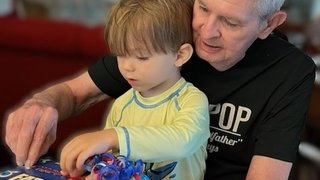
Ryan Dant was afraid. He knew he likely wouldn’t live to see his 11th birthday due to a virulent disease that would stiffen his limbs, attack his heart, and destroy his brain.
“What’s it going to be like when I die?” his father, Mark, recalls being asked one night as he tucked his son into bed.
Diagnosed at age 3 with mucopolysaccharidosis (MPS) – a deadly condition that had no known treatment – Ryan and his family embarked on a desperate mission to save his life, all the while watching his body and brain steadily deteriorate.
In a perpetual race against time, Ryan went from just beyond death’s grip to a lifesaving treatment that has now brought him to the pinnacle of his dreams: a college degree and a future he once believed was not possible.
Five years after UT Southwestern Medical Center began a compassionate-use clinical trial that restored much of his brain function, the 29-year-old is a medical marvel whose success story gives hope to others facing similar plights.
“It’s an incredible story that shows us there is so much recovery that can go on in the brain,” Dr. Maher says. “Ryan will be forever my grounding to the idea that sometimes you must get out on the leading edge and take a chance.”
“I feel more confident; I can do things without fear of failure,” says Ryan, who graduated in May from the University of Louisville with a bachelor’s degree in sports administration. “I’ve been successful in the classroom, which means I can now be successful in life.”
Without intervention, Ryan would have succumbed to severe brain damage like so many other MPS patients before him, notes Elizabeth Maher, M.D., Ph.D., Professor of Internal Medicine, and Neurology with UT Southwestern’s Peter O’Donnell Jr. Brain Institute.
Deadly Diagnosis
Mark and Jeanne Dant were raising a happy, intelligent child in the late 1980s. Ryan’s growth was normal in his first few years, his body coordination was on par, and his vocabulary was expanding just like most children his age.
Then in 1991, a liver issue brought Ryan to UT Southwestern, where doctors noticed his body was not properly breaking down proteins that build bone, tendons, and other tissue.
They diagnosed him with MPS1, a subset of the disease in which the buildup of these proteins overtakes cells and eventually leads to stunted growth, stiffening and curling of limbs, deafness, heart disease, breathing problems, and mental deterioration.
Ryan wasn’t expected to live beyond age 10.
His father took the news hard but resolved to educate himself on the disease and find answers. He traveled to a conference in Denver, where he met other families dealing with MPS1. There he saw a harsh reality: children in the latter stages of the disease, dying, none older than 12.
Even more discouraging, he discovered that research on the rare disease was limited and a substantial amount of funds was needed to further the work.
“But I wasn’t going to let him die,” Mark Dant says.
Rescued with Research
Working full time as a police officer in the suburban Dallas community of Carrollton, Mark Dant spent his nights and weekends knocking on doors and meeting with neighbors and businesses to raise funds for MPS research.
The effort started slowly, with a local bake sale raising $342 for the Dant family’s newly created Ryan Foundation. He continued getting the word out over the next few years, eventually raising more than $1 million by convincing corporations and even golf tournaments to support research.
But Ryan’s condition was worsening. By age 7, he was passing out from severe headaches and having difficulty breathing; his fingers had curled so much that he was forced to quit his favorite sport of baseball because he couldn’t hold the bat.
On weekends, while other children were playing Little League, Mark Dant was driving Ryan to the physical therapist – taking a longer route just to avoid him seeing the baseball fields.
“From a selfish perspective, I didn’t want to see it, either,” Mark Dant says.
In 1998, shortly before his 10th birthday, Ryan boarded a plane to join a group of 10 children participating in clinical trials at UCLA to test a promising synthetic enzyme that his father’s fundraising helped bring beyond the lab.
The patients showed improvement under the treatment, which was administered into the bloodstream and broke down the proteins that had been building up in the cells. Ryan’s fingers and limbs gradually uncurled and loosened, his breathing became easier, and by age 12 he resumed playing the sport he loved.
But Ryan’s fight against MPS was far from over.
Deteriorating Brain
A couple years into high school, Ryan’s grades began to suffer. He studied for hours but remembered little to nothing the next day.
Annual cognitive tests he had been taking since childhood confirmed Ryan’s brain was in dangerous decline.
Doctors discovered the enzyme treatments were not reaching his brain, and the buildup of the glycosaminoglycan molecules had been causing his cognitive function to deteriorate. He would eventually become severely mentally disabled unless something could be done.
The news devastated Ryan.
“We were all upset. We didn’t have any other options,” Ryan says.

Discovering Hope
Ryan posted a note on social media “about a door being closed,” recalls Sarah McNeil, a research nurse at UT Southwestern who had been involved in Ryan’s treatments during the initial trial. She shared his story with Dr. Maher, Director of UT Southwestern’s translational research program in Neuro-Oncology, part of the Annette G. Strauss Center for Neuro-Oncology.
Dr. Maher initiated the process to get a compassionate-use trial approved, based on the earlier protocol. But her team wasn’t sure it would work because Ryan’s spinal canal was severely narrowed from the proteins clogging it up and lacked a clear path for the treatment to reach the brain. The hope was that repeated injections of the enzyme into the spinal fluid would unclog the canal.
Restoring IQ
“We felt like Ryan was at a point in his life where we really needed to try,” Ms. McNeil says.
Ryan’s first spinal injection was performed in 2012 by Edward Stehel, M.D., who is an Assistant Professor of Radiology and part of the O’Donnell Brain Institute and the Harold C. Simmons Comprehensive Cancer Center.
Dr. Maher and the team hoped it could be a significant step in establishing a new treatment option for other MPS patients facing cognitive decline.
Soon thereafter, Ryan started with a light academic load at a Dallas-area community college.
The effects came slowly, too subtle to notice at first but all pointing toward one conclusion when put together over a couple years of cognitive testing: Ryan was getting smarter.
He started remembering what he studied, earning A’s and B’s, and improved enough to transfer to the University of Louisville, where he also served as equipment manager for the football team.
“We had only hoped to stop the neurocognitive decline, but as the enzyme worked to break down the proteins, Ryan got better. This stunning result is giving us a road map to how we can think about other diseases in the brain. Ryan’s journey will impact the lives of countless other children,” says Dr. Maher, a medical oncologist with the Simmons Cancer Center.
Dream Come True
Ryan has lived long beyond the life expectancy of MPS patients, being one of only four survivors of the 10 initial clinical trial participants.
He has helped demonstrate a treatment method that could save more lives and has set an academic standard that gives others hope for bright futures.
Ryan has a girlfriend and, with his college degree in hand, he’s looking forward to pursuing a career in sports administration, perhaps one day working in operations for a Major League Baseball team – “any team that will allow me to work for them,” he says.
Mark Dant still tears up when talking about his son’s battle to live. He says that watching him not only survive the disease but walk across the stage to receive a college degree was more than he could have hoped for when he started the long-shot journey to save Ryan’s life.
“Sarah (McNeil) could have said they don’t do experimental MPS treatments here. Dr. Maher could have said that it’s a really great story; they should go find someone to do that treatment,” he says. “But they gave it a shot, and look where we’re at today. It was worth the try.”











